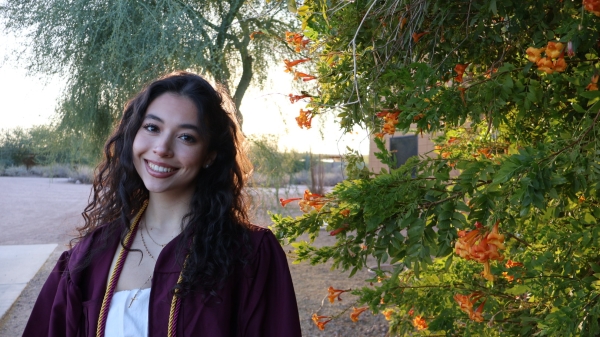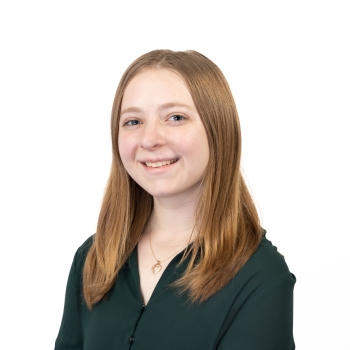While other 18-year-olds were apartment hunting or applying for their first internships, Samantha Harker was starting her neuroscience PhD at Arizona State University.
Only two years later and she’s received over $320,000 in awards to support her research, most recently including two predoctoral fellowships: one from the National Institutes of Health and the other from the Autism Science Foundation.
So much success at such a young age is certainly unconventional, but that’s what Harker’s path into academia has been. She started taking college courses after only one year of high school, not only because she loved school and excelled in it, but also because school gave her a path to freedom.
“I had to leave a not-so-great situation. And school was kind of an avenue out of that. I was able to ... go to college full time through this independent study track. And then from there, I was able to get scholarships so I could support myself and then move away."
She earned a bachelor's degree in English from ASU as well as a bachelor's degree in medical humanities from the University of Health Sciences and Pharmacy in St. Louis in 2022.
Once she finished her college courses, she knew she wanted to pursue a PhD so she could research autism –– a condition she is diagnosed with, and that many people know very little about. That’s true of doctors, too; they often bring assumptions about autism into their work, which harms autistic people, Harker says — something she's experienced firsthand.
“A lot of autistic people, specifically women, are often told, ‘Oh, you don't look autistic,’ as if it has a certain look. ... In my own experience trying to even obtain a diagnosis, my doctor told me, ‘No, you don't look like an autistic person; you're not autistic.’”
Harker is passionate about dispelling such misconceptions by spreading awareness with the hope of improving autistic people’s quality of life. She often works to do that by sharing her own experiences on outlets like the Organization for Autism Research and, most recently, a TEDx Talk titled “I DO look autistic.”
In the talk, Harker elaborates on how little publicly accessibly information there is about autism, a condition that appears in much more diverse ways than most people realize. Autism research, too, she explains in the talk, has only looked at a small subset of all autistic people, specifically young children. Harker hopes her own research can help address that critical gap.
Working with the ABA and BEAR labs at ASU, Harker investigates genetic links between autism and Alzheimer’s, as autistic people are at a higher risk for developing the disease that causes memory loss later in life. To study that, she looks at genetic and cognitive data from autistic adults, an understudied population who experience high rates of depression and anxiety. Harker sees it as imperative to better understand autistic adults and improve their quality of life.
With the two new predoctoral fellowships, she hopes she will be able to do just that.
“Autistic people and autistic women have not really been present in the research process as much as they should have been in the past. I feel like my work is important because it involves that insight directly into how my studies are designed and proposed.”
Having autistic people involved in the research is specifically important, Harker says, because of the “troubling past” of the research, which has often been undertaken from the perspective that autism is a condition that needs to be “cured” or, worse, eradicated.
“A lot of autistic people are concerned that genetics work could potentially manifest into eugenics type of things that want to cure or get rid of autism,” she says.
But by being the person behind the lab bench, Harker hopes to avoid enabling such problematic perspectives and create knowledge that benefits her community instead.
“I'm hoping to do positive work for anyone that really cares about autism and cares about an autistic person in their life. And, ultimately, I’m just doing it with the emphasis on improving someone's quality of life and making them feel like they have value.”
More Sun Devil community
Hundreds of new Watts College alums celebrate during fall ceremony
Hundreds of new graduates celebrated their first day as Arizona State University alumni Dec. 17 at the Watts College of Public Service and Community Solutions fall 2024 convocation ceremony…

Passion for human behavior drives first-gen student to major in psychology
Editor’s note: This story is part of a series of profiles of notable fall 2024 graduates.Natalie Motta is a driven and accomplished young woman who embodies resilience, ambition and a…

ASU grad turns interest in true-crime podcasts into passion for forensic psychology
Editor’s note: This story is part of a series of profiles of notable fall 2024 graduates.Kymberlin Quackenbush exemplifies resilience and ambition as she prepares to graduate from ASU’s New…
